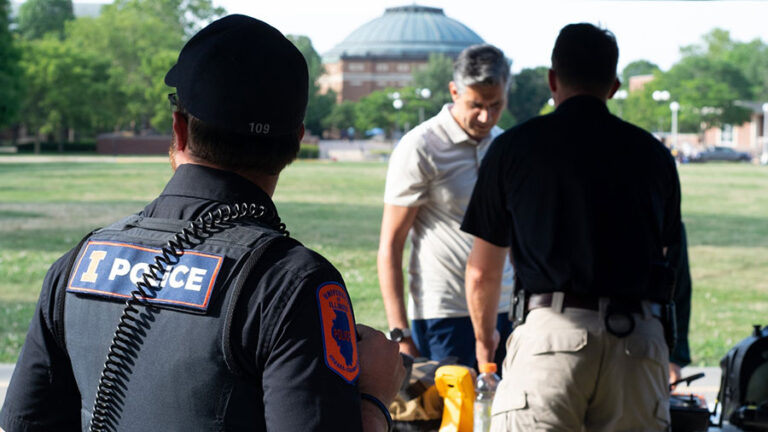CHAMPAIGN — The University of Illinois Police Department has requested nearly a million dollars in federal funding to open a real-time crime center.
The center would enable police officers to receive more information from a growing number of surveillance methods while responding to incidents, according to UIPD spokesperson Pat Wade.
If the real-time operators find anything of “evidentiary value,” that information can be communicated to the officers, he said.
“We are already using [automatic license plate readers] and we think a real-time crime center would enhance our ability to use those in real-time,” Wade said.
The center would also draw information from drones and other surveillance technologies that have already been purchased, including digital evidence recovery equipment for investigations and dogs trained to detect explosives. UIPD has also purchased additional training courses for officers and emergency management equipment for the Campus Emergency Operations Center that connects police with other first responders.
U.S. Rep. Nikki Budzinski (D-Springfield) representative Nikki Budzinski put in the request for $963,000 of federal funding for the center “because it would allow for expanded and enhanced prevention, monitoring, and response to crimes-in-progress in order to protect students and community members,” she wrote in a letter to Congress.
Documents obtained by Illinois Public Media and the Invisible Institute reveal the department’s larger plan for the coming fiscal year: “to target‐harden our campus against violence and to make sure we are equipped and well‐trained (even more so than we already are) to address an attack should one occur,” then Police Chief Alice Cary, who announced her departure in August, wrote in a June 8 email.
“Campus administrators have already committed to making this happen one way or another,” Cary wrote in another email on Sept. 15.
Across the U.S., 135 police departments have established real-time crime centers, according to data from the Electronic Frontier Foundation’s Atlas of Surveillance project, which monitors police surveillance technology.
“They are taking the law enforcement world by storm,” said Elizabeth Daniel Vasquez, a lawyer with the Brooklyn Defender Services who consults on cases involving complex forensic science and surveillance issues.
Emails reveal the University of Illinois’ commitment to funding the new surveillance initiatives includes an initial $1.5 million and approximately $911,000 in annual recurring costs.
Documents show the department started the request for funding the real-time crime center and more advanced surveillance technology in 2022. Wade said UIPD formally proposed the idea for the new center after a shooting at Michigan State University in February 2023.
The center, he said, could be helpful in monitoring shootings and emergencies on campus. So far, the department has not secured federal funding.
“We’re trying to figure out funding for this entire package and what’s going to be the most useful and the most impactful for campus safety right now,” Wade said.
But some residents feel the department hasn’t effectively justified the need for the amount of funding it’s requesting for a real-time crime center.
“That’s like your child’s saying, ‘I want this thing because my friend has this thing,’” said Champaign resident Derek Briles. “We’re always approving new police technology and then finding justifications for it after the fact.”
One year after adding license plate readers to the more than 2,300 cameras UIPD currently operates, the department said the readers helped solve many crimes on campus — from a hit and run to a string of stolen scooters.
The plate readers “have already provided critical information that led to the closure of a number of criminal investigations, and they will continue to be useful in that way regardless of the status of a real-time crime center,” Wade said.
The Champaign City Council approved the purchase of license plate readers for $240,500 last year. One month earlier, the Urbana City Council voted against them, citing concerns about privacy and the readers’ effectiveness.
UIPD does not respond to a representative oversight body, like the Champaign or Urbana City Councils. As of February 2023, UIPD had five license plate readers.
Champaign City Council member Davion Williams acknowledges that increasing surveillance technology allows police to catch more suspects. However, he argues that tackling the underlying issues that lead to crime may be a more effective strategy.
“It helps catch an individual but it’s not going to prevent it,” Williams said.
Farrah Anderson is an investigative reporting fellow with the Invisible Institute and Illinois Public Media, and a journalism student at the University of Illinois. Follow her on Twitter @farrahsoa.

